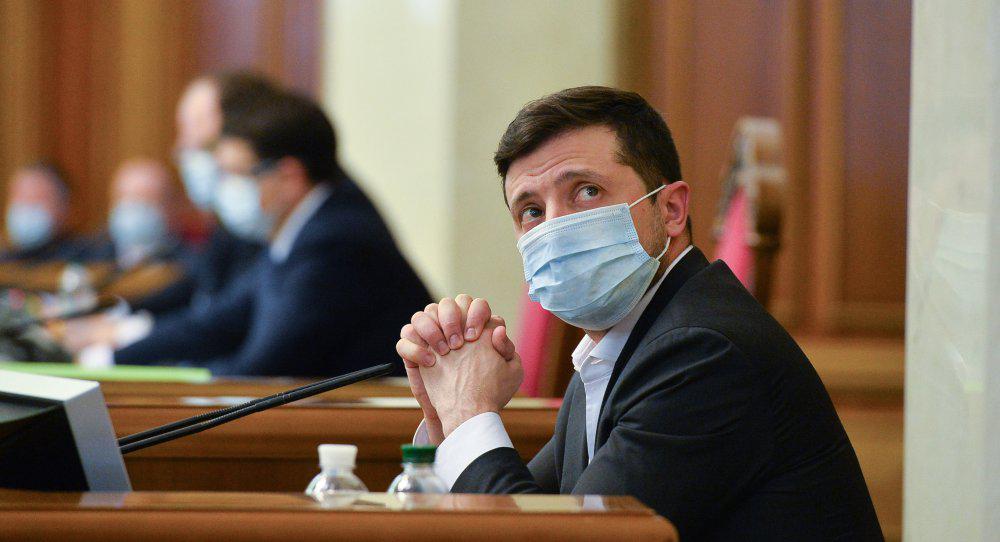A year after Ukrainian President Volodymyr Zelenskiy took office, the balance sheet is mixed.
In a deliberately vague election campaign, two topics had featured prominently: the fight against corruption and peace in war-torn eastern Ukraine. Both issues were—and still are—among the top priorities of the Ukrainian population. Connecting with the public proved to be one of Zelenskiy’s main assets; once he was in office, this skill turned into a focus on approval ratings as a basis of policymaking.
Zelenskiy’s landslide victory in the second round of the 2019 presidential election expressed a consensus across Ukraine. Voters could not know what a Zelenskiy presidency would bring, but they were prepared to take the risk.The degree of disappointment with the previous president, Petro Poroshenko, had been underestimated not only by the incumbent himself but also by political and cultural elites.
Poroshenko’s ill-judged election slogan “Army, Language, Faith” illustrated how far he had left the public behind. His war rhetoric and a narrow ethnolinguistic definition of what it meant to be Ukrainian ran counter to what opinion polls had shown for a while: a strengthening inclusive civic identity centered on the state and citizenship. Political newcomer Zelenskiy acknowledged and embraced this trend, bolstering the Ukrainian state from within.
However, neither of Zelenskiy’s main objectives—ending corruption and the war—has been met. To be fair, a year is not a realistic timeframe for either of these ambitious goals.
Zelenskiy tried to send a strong signal early on: in his inauguration speech, he confronted parliamentarians by announcing an early parliamentary election and a plan to end their immunity from prosecution. Zelenskiy’s party in the making, Servant of the People, emerged from the election with a clear majority in Ukraine’s parliament.
The government’s majority and a high turnover of elites brought both opportunities and risks. It seemed possible to implement long-overdue reforms that had previously been blocked by oligarchic interests. Critics often overemphasized the new elites’ lack of experience: many had relevant backgrounds in business, civil society, or local politics. The bigger risk was uncertainty over whether and for how long the president’s amorphous bloc would be able to govern effectively.
The government drew up complex reform packages and railroaded them through the parliament. The plans contained many sensible elements, but the procedure by which they were adopted was hardly democratic. Zelenskiy refilled many vacant key positions in Ukraine’s anticorruption institutions, including the pivotal role of prosecutor general, and graft investigations resumed with a new drive.
However, there have been few tangible results, in particular in the trials of prominent suspects. What is more, speculation about the extent to which Igor Kolomoyskiy, one of Ukraine’s biggest oligarchs, influences Zelenskiy’s decisions overshadowed the president’s anticorruption agenda from the start.
Zelenskiy has continuously emphasized the need to address the populations of Crimea, which Russia annexed in 2014, and of the non-government-controlled areas of Ukraine’s eastern Donbas region as Ukrainian citizens, and negotiate with Russia to end the war.
Zelenskiy’s domestic opponents were quick to accuse him of selling out to Moscow, but these fears have not materialized. When the coronavirus pandemic hit, his most controversial idea of holding local elections in the fall across the country, including in the whole of the Donbas, became unrealistic.
In December 2019, Zelenskiy’s presidency enabled the first summit of heads of state in three years in the Normandy format, which brings together France, Germany, Russia, and Ukraine to negotiate an end to the war. Like previous summits, the meeting failed to guarantee a lasting ceasefire. But it did lead to two prisoner exchanges, some humanitarian measures, including slightly easier access across the contact line between the warring sides in the Donbas, and limited troop withdrawals.
Zelenskiy provided a new momentum for the negotiations, but the pandemic has halted this momentum at the international and the domestic level. The Ukrainian president has also advocated back-channel negotiations with Russia, but this idea is controversial and hard to implement.
The biggest shortcoming of Zelenskiy’s presidency to date is that he has made no attempt to consolidate his party and strengthen the parliament and the government. Zelenskiy’s hierarchical approach to his parliamentary party, repeated and badly timed government reshuffles, and the dismissal of the recently installed and widely respected prosecutor general, have eroded domestic and international trust.
Zelenskiy’s parliamentary majority did not even hold for a whole year. A group of members of parliament is now trying to block banking regulations that are part of the International Monetary Fund’s conditions for a new loan to Ukraine and go against Kolomoyskiy’s interests. In the coming months, Zelenskiy—like his predecessors—will have to hope for ad hoc parliamentary coalitions from one vote to the next.
The coronavirus seems to have slowed the gradual erosion of public trust in Zelenskiy. In a survey conducted by the Kyiv Institute of International Sociology on April 22–24 on behalf of the project Identity and Borders in Flux: The Case of Ukraine, about 55 percent of respondents thought Zelenskiy had been handling the pandemic “very well” or “fairly well.” Topics like corruption and the war in the Donbas have temporarily moved into the background.
Yet, Zelenskiy’s popularity is bound to fall when the socioeconomic costs of the pandemic hit home. Against the backdrop of weak political institutions, a new cycle of confrontation between the executive and the parliament, another early parliamentary election, and protests is becoming increasingly likely.
Gwendolyn Sasse is a nonresident senior fellow at Carnegie Europe and director of the Centre for East European and International Studies (ZOiS) in Berlin.







.jpg)
